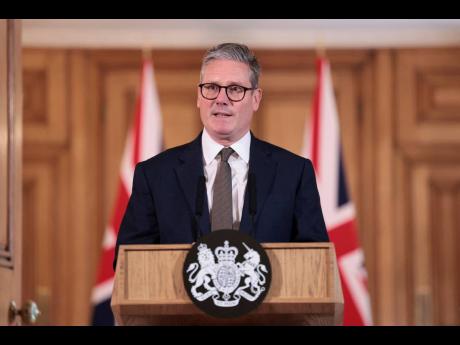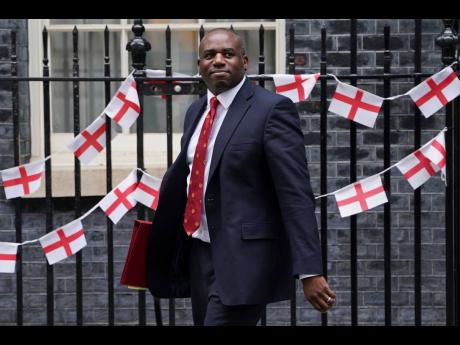Elizabeth Morgan | How will CARICOM relate to the UK’s new Labour government?
On July 4, the United Kingdom (UK) held general elections and in the early morning of July 5, it was clear that previous predictions and exit polls were correct that the centre-left UK Labour Party, led by Sir Keir Starmer, would form the government. Fourteen years of government by the centre-right Conservative Party was ended.
The Conservative years began in 2010 with David Cameron as leader and prime minister. The party would take Britain into a referendum on its membership of the European Union (EU) known as Brexit. It would take Britain out of the EU and have four other leaders and prime ministers – Theresa May, Boris Johnson, Liz Truss, and Rishi Sunak (Britain’s first prime minister of Indian descent). Their period in office was further complicated by the COVID-19 pandemic and the war in Ukraine.
CARICOM and its member states will now be adjusting to working with the new Labour government. Sir Keir has appointed David Lammy, of Guyanese descent, as his secretary of state for Foreign, Commonwealth and Development Affairs (foreign secretary).
The issue, which Mr Lammy has had to address immediately related to CARICOM, is the passage of Hurricane Beryl. The UK increased support up to £500,000 for the countries most affected and assistance to the Caribbean Disaster Emergency Management Agency (CDEMA).
FOREIGN RELATIONS PRIORITIES OF THE NEW LABOUR GOVERNMENT
In its manifesto, the priorities of the new Labour Government in foreign relations are given as:
1. Rebuilding relationships – The United Kingdom will be working to strengthen its relationship with key allies, the United States and the European Union, although Britain will not rejoin, and will be working with allies to build, strengthen and reform indispensable multilateral institutions. The UK will also work through NATO, the UN, the G7, the G20 and the Commonwealth to address threats and to uphold human rights and international law.
2. Defending the country’s security – The Government will be working to strengthen the UK’s security, to support Ukraine, to address corruption and money laundering, to look strategically at its relationship with China, protect the British overseas territories and crown dependencies, including the Falklands and Gibraltar, which will include defending their sovereignty and right to self-determination.
3. Championing UK prosperity – Focusing on growing the British economy with the objective of attracting foreign direct investment into the UK, expanding markets for exporters, and shaping the emerging regulatory frameworks.
4. Climate leadership – Being a leader in the global effort to address the climate crisis, and creating a new clean-power alliance, bringing together a coalition of countries at the cutting edge of climate action.
5. Strengthening diplomacy – Strengthening Britain’s influence abroad, defending its national interests, promoting progressive values, and protecting British nationals, among other things.
6. Modernising international development support – Rebuilding Britain’s reputation on international development (overseas development assistance) with a new approach based on genuine respect and partnership with the Global South to support common interests. The aim will be to align development support to foreign policy and return to the financing level of 0.7 per cent of GDP to support economic transformation, tackle unsustainable debt, empower women and girls, promote conflict prevention, and unlock climate finance.
CARICOM’S PRIORITIES
CARICOM member states, except for Haiti and Suriname, have had a very long relationship with Britain as a former colonial power. The relationship since independence has been bilateral, through the EU until Brexit, and through the Commonwealth.
Biennially, Caribbean countries, including the Dominican Republic, have met with Britain in the UK/Caribbean Forum. The 11th Forum was held in Jamaica in June 2023. The communique gives an indication of the areas of interest for CARICOM which they would want to discuss with this new government.
These include:
1. Trade in goods and services and investments – The Caribbean (CARIFORUM) has an Economic Partnership Agreement with the UK which has a mechanism for implementation and consultations. There had been a UK trade envoy to the Caribbean. Trade and investment are key issues for CARICOM countries;
2. Financing for Development – Securing financing for the UN Sustainable Development Goals had become more difficult and CARICOM hoped that the UK, as one of its principal development partners, would restore its development financing to 0.7 per cent.
3. Cooperation in health and education – That the UK would continue its collaboration with CARICOM countries in the development of the health sectors and in education, with continuation of scholarships.
4. Security and defence cooperation – That collaboration would continue with the UK to address a range of security issues in the region, including organised crime, cyber and marine security, illicit financing, and strengthening the justice systems.
5. Energy and food and nutrition security – To support development and implementation of clean-energy projects and promote expansion of agriculture.
6. Climate change and the environment – Cooperation in implementing the outcome decisions on climate change resulting from the various UN conferences on climate change. The CARICOM countries would want to see the UK further cooperate in reducing emissions and securing financing for climate mitigation and building resilience.
There is at least one other difficult issue on CARICOM’s priority list. It will be interesting to see how it will be addressed by a foreign secretary with Caribbean links, who in his first address on assuming office, described himself as “a descendant of enslaved people”. It has been noted, however, that frequently, positions held by political figures when out of office are not the same when in office.
Besides the usual formal congratulatory messages/calls at the start of a new administration, CARICOM heads and foreign ministers could be meeting formally with the new British prime minister and his foreign secretary in the not too distant future at the UN General Assembly in New York in September and the Commonwealth Heads of Government Conference in Apia, Samoa, in October.
They will have an opportunity to reflect on their approach to this new administration when CARICOM heads meet. Their 47th Conference in Grenada had to be rescheduled due to Hurricane Beryl.
Elizabeth Morgan is a specialist in international trade policy and international politics. Email feedback to columns@gleanerjm.com.


